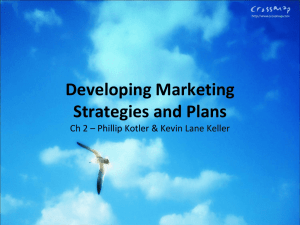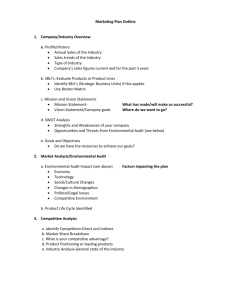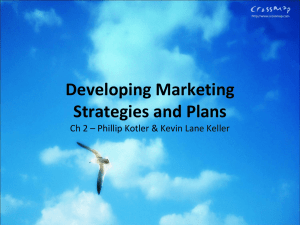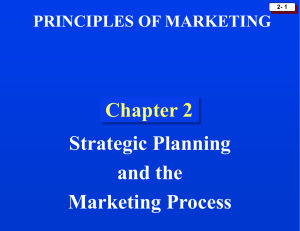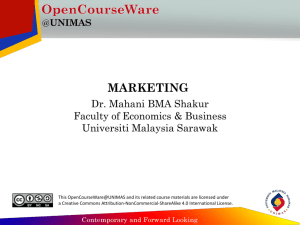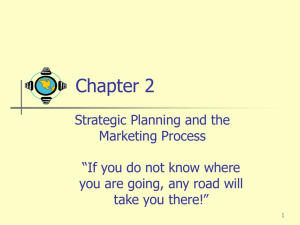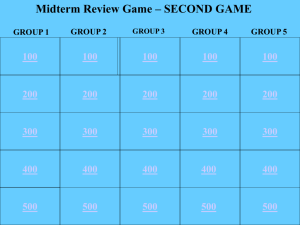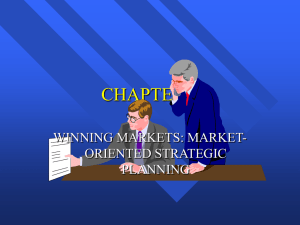Course Description - UCF Regional Campuses
advertisement
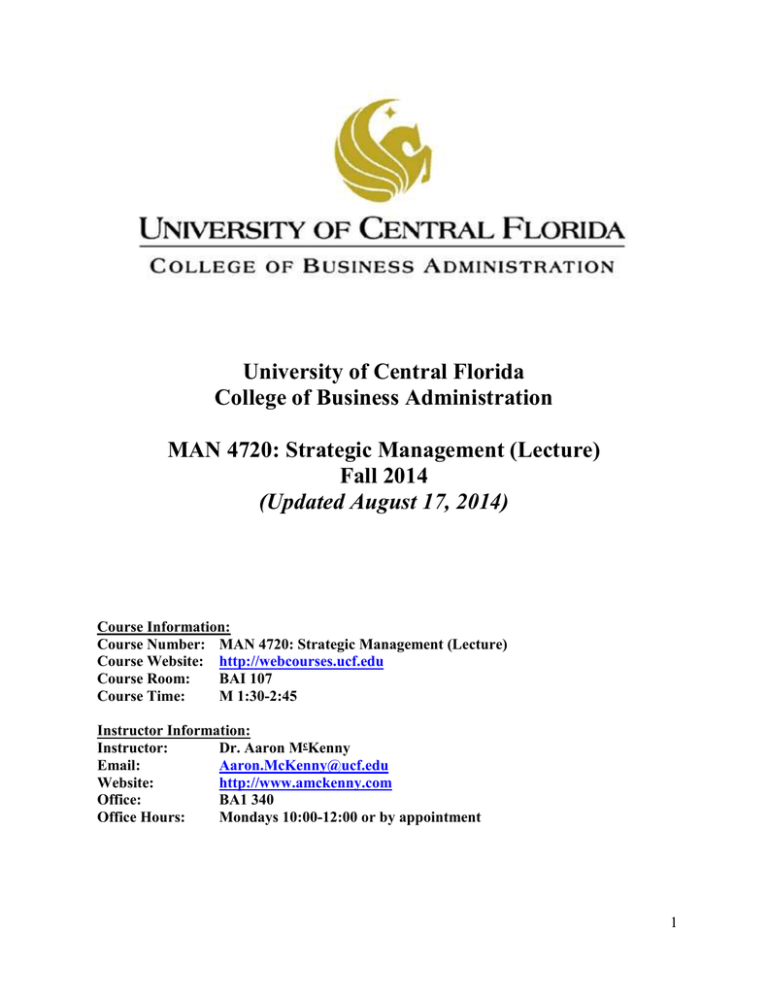
University of Central Florida College of Business Administration MAN 4720: Strategic Management (Lecture) Fall 2014 (Updated August 17, 2014) Course Information: Course Number: MAN 4720: Strategic Management (Lecture) Course Website: http://webcourses.ucf.edu Course Room: BAI 107 Course Time: M 1:30-2:45 Instructor Information: Instructor: Dr. Aaron McKenny Email: Aaron.McKenny@ucf.edu Website: http://www.amckenny.com Office: BA1 340 Office Hours: Mondays 10:00-12:00 or by appointment 1 Course Description: While the context of the course is heavily embedded in the strategic management of organizations, an understanding of strategic decisions making process will likely benefit you in more ways than are readily apparent. Knowing why and how strategic decisions are made and implemented will not only help you become a better strategic decision-maker yourself, it will also help you anticipate strategic decisions made by others that will ultimately influence your career. This course is designed to test students at the first three levels of Bloom’s Taxonomy (Knowledge, Comprehension, and Application), with special emphasis on the application level. Some class time will be spent ensuring that you know the materials discussed; however, the bulk will be spent on developing your command of the course materials at the comprehension and application levels. Course Materials: Required textbook: Ketchen, D.J., & Short, J.C. (2012). Mastering Strategic Management, New York, NY: FlatWorld Knowledge. PDF: Available for free at http://www.saylor.org/site/textbooks/Mastering%20Strategic%20Management.pdf eBook/Electronic/Hardcopy: https://students.flatworldknowledge.com/course/1671031 Other helpful resources: Short, J.C., Bauer, T., Ketchen, D., & Simon, L. (2010). Atlas Black: Managing to Succeed, Nyack, NY: Flat World Knowledge. (Chapters 1-5) Electronic: http://www.teacherspayteachers.com/Browse/Search:atlas+black Memorization tool: http://www.memrise.com/course/338067/strategic-management-11/ Learning Outcome Statements: By the end of this course, each student should be able to: Use strategic management methods and frameworks to analyze the internal and external strategic environment of the firm Evaluate alternative strategic actions to arrive at a feasible recommendation and implementation plan. Explain the concept of a sustainable competitive advantage and identify ways in which a firm might establish such an advantage Apply knowledge gained in this and other business-related classes to real-world situations. 2 Applied Strategy Incorporated (ASI) (Course Details): For many of you, this will be the last course that you take before you graduate and start putting the business knowledge you have learned over the past few years to use. To facilitate this transition, this course is operated as much like a company as is possible in an academic environment. Accordingly there are some things you should understand about this course that may (or may not) differ from previous courses: Terminology – You are all new employees (students) of Applied Strategy, Incorporated (ASI the course). As part of your on-boarding, you will be responsible to attend training sessions (classes). You will participate in two training sessions per week: corporate-level (lecture) training sessions taught by the CEO (me), and SBU-level (lab) training taught by your SBU manager (lab instructor). Your training manual (textbook) will be a key resource for you in your pursuit of maximizing your compensation (grade). Expectations – At ASI, we have the best employees in the world, and we reward their performance accordingly. In turn, we hold high expectations for our employees. Many of these expectations are outlined explicitly in your employment contract (this syllabus); however, as with most contracts, this document cannot cover every contingency you may be faced with. As a result, we expect that our employees will act as professionally and ethically. In sum, we expect you to act as world-class organizational citizens. Organizational Structure – We pride ourselves on the unprecedented access we give employees of all levels to the top management team (i.e., CEO and SBU managers). However, it reflects badly upon new employees when they needlessly escalate questions/issues to top management when resources at lower levels have not been exhausted. Please consider the following hierarchy for escalating your questions/issues: 1. Employment contracts/training session notes + recordings/ASI website (Canvas)/Internet 2. Your colleagues 3. University resources (where applicable - e.g., tech support for Canvas issues, library for data sources) 4. Your SBU manager 5. The co-COOs (Nika Cresswell and Andre Fountain, Jr.) 6. The CEO Contacting the CEO/COOs – If you do need to contact me, the best way to contact me is to come to office hours or via email at: aaron.mckenny@ucf.edu. Due to the Family Educational Rights and Privacy Act, all communications should come from your UCF email address so that I can verify that you are asking. Further, it is illegal for me to discuss any aspect of your being in my class with people not directly involved in your education (e.g., parents) unless you provide written, signed, and notarized documentation giving me permission to do so. I will not respond to questions about your deliverables (e.g., exams, projects, assignments) in the 24 hours prior to their deadline. I do this for several reasons. First, it encourages employees to prepare deliverables well in advance of the deadline. Second, it provides me with enough time to be thoughtful in my response. Third, it provides employees with sufficient time for them to 3 incorporate the feedback into their deliverable. Finally, asking top management about key information at the last minute reflects poorly on the employee’s preparedness and calls into question the quality of the pending deliverable. Please only contact the COOs with questions regarding the non-content aspects of the course (and only after exhausting each of the previous levels). Questions about course content should be directed to the CEO if the SBU manager could not answer your question. As with the CEO, the COOs are not obliged to respond to emails/calls about your deliverables in the 24 hours prior to their deadline. Training Meetings (Classes): Corporate training – Corporate training will take place on Mondays from 1:30-2:45 pm in BA1 107. Each training session will cover a different aspect of the strategic management process. You are expect to have a baseline understanding of the course materials attending each training session. Reading the assigned chapter(s) in the training manual and using the associated module in the memorization tool should be sufficient preparation. I believe that you will get the most out of your training if you come to the sessions in person; however, the corporate training sessions will also be captured for remote viewing. SBU training – On-the-job training is not very effective if you are not there…on the job. Accordingly, on-site attendance of SBU training is mandatory. These training sessions will reinforce the material from the training manual and corporate training, and are very interactive, hands-on, and conversational. Each week you will tackle work given to us by our clients. Self-directed training – Human resources has organized supplemental activities designed to complement the formal training sessions and enhance your career at ASI and beyond. These activities include watching online videos on a wide variety of business topics, attending special workshops and events, and reading important articles aimed at enhancing your career. These activities will be announced as the semester progresses. Compensation (Grades): Management Development Program employees all share the same compensation structure. Salary is determined by each employee’s performance on key deliverables. These deliverables are worth 1,000 points total. At the end of your program, your points will determine your compensation (grade) using the following scheme: 930+ 900+ 870+ 830+ 800+ 770+ “A” “A-” “B+” “B” “B-” “C+” 730+ 700+ 670+ 630+ 600+ Under 600 “C” “C-” “D+” “D” “D-” “F” 4 You will be evaluated both as an individual and as part of your team. Individual Evaluation Deliverables: Exit Interview (Survey) Weekly Interviews (Quizzes) 10-K Integration Project Midterm Assessment (Exam I) Final Assessment (Exam II) Total (Individual) 10 90 100 150 150 500 Team Evaluation Deliverables: Industry Analysis Report Industry Analysis Presentation Strategic Analysis Report Strategic Analysis Presentation Total (Team) 100 100 150 150 500 Grand Total 1,000 Deliverables: Interviews During the semester you will be given ten interviews (quizzes) to test your developing knowledge as a strategy analyst. Each interview is worth 10 points, however, your lowest interview score will be dropped to calculate your total of 90 points possible for interviews in this course. These interviews will be based on the material presented in the corporate training meetings and will be administered in your SBU meetings. There will be no make-up options for missed interviews. As of Fall 2014, all faculty members are required to document students' academic activity at the beginning of each course. In order to document that you began this course, please complete the first interview by no later than August 26. Failure to do so will result in a delay in the disbursement of your financial aid. When you leave the organization, you will also be asked to complete an exit interview (survey) to provide feedback regarding your experience as a student in the UCF business program. This is worth the equivalent of one weekly interview (quiz) and will quite possibly be the easiest 10 points you have ever earned. 5 Major Assessments (2: Midterm and Final Exams) Major assessments (exams) will be administered to determine your progress in mastering analyst language, tools, and applications. For students taking the class at the Orlando campus, you will take the exam in the BAII 104 testing lab. For students taking the class at satellite campuses, you will take the exam at the respective campus’ testing lab. You may not take exams at alternative locations. Each assessment is worth 150 points. Each will cover material from training meetings (lectures), the book, and supplemental materials like the “Capstone off the Books” videos. All items are multiple-choice. However, they are not all simply exercises in memorization. Almost all of the questions move beyond simple recall to tap your deeper understanding of the material and your ability to apply it. Check the weekly schedule for the dates of the assessments. Be sure to take advantage of the COBA Pass system! http://www.bus.ucf.edu/cobapass/ NOTES: Assessments will not be administered early under any circumstance. Makeup assessments will be allowed only under exceptional circumstances, will be entirely in essay format, and will be administered by the CEO or the COOs. Excused absences are subject to verification. This means that either the COOs or I will call the doctor/police/etc to verify that the documentation you provide me is accurate and that, in their judgment, you could not have taken the exam during the time allotted. If they cannot or will not verify the documentation, the absence is unexcused – so make sure you make the appropriate arrangements as needed. Employees are expected to consult with their SBU manager and the CEO as soon possible if a planned assessment cannot be met. REGIONAL CAMPUS EMPLOYEES NOTE: The testing lab times on the regional campuses do not always align with the main campus times. Check with your SBU manager (lab instructor) and/or your testing lab for assessment times at your campus! This is your responsibility. “Capstone off the Books” The capstone course is a four credit hour course. The fourth credit hour allows us to delve into a variety of interesting aspects of business that would not fit within a three-hour Strategic Management course. We will refer to these supplemental training opportunities as “Capstone off the Books.” There are no separate deliverables associated with Capstone off the Books, but the midterm and final assessments may include questions on each to assess your understanding of the material covered in them. Projects & Case Analyses In addition to regular meeting activities, you will have the opportunity to participate in three larger projects during the semester. The first, the 10-K Integration Project, is an individual deliverable, based on your analysis of a firm’s 10-K document. The second is a team deliverable involving an industry analysis, an in-depth investigation of several companies competing in the same industry. The third is a team deliverable involving a strategic analysis and strategic 6 recommendation for a specific firm. The second and third projects will be presented in both paper and presentation formats, with the strategic analysis presentation being the foundation for the Great Capstone Case Competition. The 10-K Integration Project (an individual deliverable) You will have the chance to showcase your individual research, analysis, and writing skills in the 10-K Integration Project. Details will be presented in a separate document. This project involves selecting a publicly-traded firm in the industry you are assigned to study, digging into the business analysis section of its 10-K, and then applying what you discover there to the industry analysis and strategic analysis frameworks developed in our training meetings. This project is not a full-blown industry or strategic analysis. Rather, it is an opportunity to take a first look at some real-world information and see how it maps onto the industry analysis and firm analysis tools we will be using in the course. Thus, the project allows you to learn more about a company you are interested in, and gives you a chance to use some of the tools that will be critical in the subsequent case analyses. Guidelines will be provided to aid you in your project. Industry Analysis (a team deliverable) Your team represents a consulting firm that has been asked to provide an analysis of a specific industry, with respect to its current, real-world situation. You will use the results of your individual 10-K research as primary sources of information for your industry analysis. A significant portion of our training material and activities will be oriented toward learning how to perform quality industry analyses. This effort will culminate with a 10-15 page summary using the worksheet outline, and a presentation to your SBU manager. The Industry Analysis Report (more specifics to follow) The goal of this project is to conduct a competitive analysis of an industry. The worksheet contains several sections. It begins with an executive summary and introduction, followed by sections titled: 1) The Industry's Dominant Economic Features, 2) Porter's Five Forces, 3) The Drivers of Change in the Broad Environment & Impact They Will Have, 4) Companies in the Strongest/Weakest Positions, 5) Key Success Factors for Competitive Success, and 6) Analysis and Summary: Industry’s Attractiveness and Prospects for Long-Term Profitability. A more detailed description of the process and format for this worksheet will be presented separately. Your team will self-manage the process by which the various research, writing, and analysis tasks are handled. It is not likely that everyone on the team will have an equal hand in each section. However, it is expected that by the end of the project, all team members will have contributed fairly equally to the overall output. 7 The Industry Analysis Presentation (more specifics to follow) Your team will use the results from the industry analysis worksheet that you develop to prepare a 10 minute presentation for your SBU manager. This research and presentation will serve as the foundation for your strategic analysis report later in the semester. This report will focus on one company in the industry that you analyzed. Strategic Analysis (of a specific company - a team deliverable) Your consulting team will also prepare a strategic analysis of a specific firm. This analysis will result in both a paper and a presentation. All teams will examine the same firm, and will address the same general strategic issue (which will be announced later). This effort will culminate with a 15-20 page paper (maximum, excluding appendices & references) and a 13 minute (maximum) presentation of your team’s analysis of the firm and your strategic recommendations for it. Strategic Analysis Report At a later date, I will announce the company to be analyzed by all teams and the particular strategic issue of concern. Your team will conduct a strategic analysis of that company, using current data and assessing their current situation and strategic needs. The paper contains several sections. In addition to information that you gathered for your industry analysis, it will include an executive summary and introduction, followed by sections titled: 1) Current company Mission and Strategy, 2) Analysis, 3) Sustainable Competitive Advantage and Major Problems, 4) Strategic Recommendations, and 5) Fallout and Summary. A more detailed description of the process and format for this paper will be provided later. Strategic Analysis Presentation Your team will have the opportunity to present your core findings of the industry and your strategic analysis as part of The Great Capstone Case Competition (see below). This consists of a 13 minute presentation and follow-up Q&A session with the judges. Your goal in this competition is not simply to present your paper. (Nobody wants to sit through a series of consecutive SWOT analyses of the same firm.) As with the industry analysis, your SBU manager will see all the details of what you did in the paper and its appendices. Your manager will evaluate all of that via the paper. Therefore, you do not need to try to convey all of that during the 13 minute presentation. Rather, your goal will be to quickly (i.e., less than a minute) summarize the firm’s situation and then move directly into what you learned from the analysis, and what strategic initiative(s) you recommend to the top management team at the company. For example, which aspects of the SWOT analysis present the greatest challenges? What sustainable competitive advantage will we build (or build upon)? What is the most opportune strategic initiative available to us right now? 8 Do we have the capacity to execute on it? How will we make it happen? And so on. Again, the goal is not to recite your paper but to provide insights about the firm and its strategic options. The Strategic Case Competition presentations start during the last few weeks of the semester. Finalists chosen from each SBU (lab) will advance to the semi-finals (and possibly to the finals as well) on the last Friday of the semester. If your team is selected to advance to the semi-finals AND you participate in that semi-final round (and in the finals as well, if your team qualifies), you are exempt from the final exam and will be awarded 150 points in lieu of taking the final exam. The Great Capstone Case Competition The Great Capstone Case Competition is the culminating event for this class, and for most of you, for your experience at the UCF College of Business. After hearing each team in the SBU present their strategic analysis, each SBU manager will choose one team from his/her SBU to advance to the semi-finals of the Great Capstone Case Competition. The SBU managers will be looking for teams that cannot only think strategically but also work well together as a consulting team, and deliver a rigorous, competent presentation of those ideas. All teams will have the opportunity to complete their case portfolio by preparing and presenting a strategic analysis of a company in real time. Of these, the best will be invited to participate in: The Great Capstone Case Competition Semi-Finals and Finals: Friday, December 5. The top teams from across Capstone SBUs will advance to the semi-final round of the competition. The teams will be seeded into several semi-final groups, and each team in each semi-final group will deliver their presentation to a panel of judges, comprised of experts including members of the UCF Executive MBA program, UCF Business faculty, and/or executives from the firm that is the target of the analysis. The judges will pick a winner from each semifinalist group to advance to the finals. Teams that advance through the Semi-Finals will go onto the Finals later that evening and will receive awards for their efforts. They will be judged by a panel comprised of faculty experts, industry experts representing the Dean’s Advisory Council, members of the UCF College of Business Hall of Fame, and the focal firm. This is your opportunity to present your skills to some absolutely top-shelf business leaders. Extra Credit Extra credit opportunities totaling 20 points are available over the course of the semester. Please consult with your SBU manager for details. Peer Evaluations ASI uses a 360º evaluation system to determine grades. Accordingly, in addition to receiving feedback from the management team, you will also be soliciting feedback from your peers. There will be two anonymous peer evaluations over the course of the management development 9 program. The midterm peer evaluation will be used to provide preliminary feedback to each team member and will not affect the points received. The final peer evaluation will affect the number of points received. Minor peer evaluation penalties generally subtract up to 100 points from your total grade. However, peer evaluation penalties for serious contribution issues may extend well beyond the initial 100 points at the discretion of the SBU manager. Details will be provided in your SBUs later in the semester. The evaluations will be based on factors such as (but not necessarily limited to) attendance at SBU meetings and team meetings, performance on assigned team tasks, leadership in team activities, ability to work well with team members, and so on. Peer evaluations provide a guide for your SBU manager’s assessment of your team performance and in most cases represent the major input. But the final assessment of your team performance lies with your SBU manager who may, under special circumstances, override those evaluations. Teams We will form teams of four to five employees in your SBUs. Team leaders will ‘hire/draft’ employees at your first or second SBU meeting. If you are interested in being a team leader you will have the opportunity to apply with your SBU manager. Each employee will complete a short survey during your first SBU meeting that allows you to share your expectations and goals for the semester. You will also indicate your schedule preferences for ‘after hours’ meetings (time outside of class). Team leaders will use your expectations/goals and schedule preferences to hire their team members. This system has proven to work very well for our applications at ASI. Problems with Team Members Non-performing team members may be fired from their teams. This may occur up to one week before the Strategic Analysis submission deadline set by your SBU manager. All teams will complete a team performance contract during your first two weeks – this will be your guide for dealing with non-performance. If a team member’s lack of contribution is hurting the team’s progress, the team should carefully document relevant issues, and meet with their SBU manager. If the issues cannot be resolved, the team member may be fired by unanimous vote of all team members and approval of the SBU manager. If this happens, the fired team member will be expected to complete all remaining team assignments on his/her own, as directed by the SBU manager. The group presentations will be replaced with individual written analyses. These assignments are due the same date that groups make their presentations. The same late penalties apply. A Quick Note on Financial Analysis If you don't remember the basics from finance, accounting (how to do NPV and ROI analysis, read balance sheets, read income statements, etc.) and marketing fundamentals, you’ll want to update or refresh your skills in these areas. Your SBU manager and I will make several suggestions on ways you can update your skills. 10 Students with Documented Disabilities: The Individuals with Disabilities Education Act of 1992 (IDEA; 20 U.S.C Section 1400 et seq.), the American with Disability Act of 1990 (ADA; 42 U.S.C., Section 12101 et seq.), and Section 504 of the Rehabilitation Act of 1973 (29 U.S.C. Section 794 et seq.) requires the University of Central Florida to provide “reasonable accommodations to any individual who advises us of a physical or mental disability.” Any student who requires special arrangements in order to meet the course requirements due to a documented disability should contact the instructor on the first day of class to make any necessary arrangements. At that time students should also present appropriate verification from the UCF Student Disability Services. For additional information, you may contact the UCF Student Disability Services office in suite 185 of Ferrell Commons, by calling 407-823-2371, or by emailing sds@ucf.edu Academic Integrity: In recent years, businesses and business schools have been under considerable scrutiny due to the corruption of business leaders (e.g. Jeffrey Skilling, Dennis Kozlowski, Bernie Madoff, etc). It is my belief that these unscrupulous individuals are the minority; however, I am morally opposed to passing those who exercise unethical judgment in my classroom. As such, I have a zerotolerance policy for all forms of academic misconduct as documented in the UCF Golden Rule and handbook (http://www.goldenrule.sdes.ucf.edu/). Penalties for any violation of the UCF Golden Rule and handbook include: grade reduction (partial or to zero), administrative drop from the course, final grade reduction (partial or to “F”), and other remedies as permitted by The University of Central Florida. The employee (student) will also be referred to Student Judicial Affairs for further potential sanctions. These are the possible penalties for violations, some more severe than others. However, this does not imply that first-time offenders or offenses that you believe are ‘minor’ will be met with a ‘slap on the hand’. Rather, you should expect the most severe response permitted by the University of Central Florida for any violation and be pleasantly surprised by any degree of restraint. If you have any questions or concerns, it is much better to ask for permission than to ask for forgiveness in this area. A Note on the Use of Study Aids Employees (students) often spend considerable time and effort seeking various study aids such as notes, guides, and “quiz-lets” created by others (for-profit or otherwise). Several points are germane here. 1. Anyone wishing to share notes, quiz-lets, or any other study aid MUST email these materials to me, the CEO, to obtain my written approval. I’ll likely approve items after a quick review. Nevertheless, this process is CRITICALLY IMPORTANT to safeguarding academic integrity in a manner consistent with UCF’s Golden Rule. If requested, I will create a discussion board 11 where approved study aids can be shared openly and legitimately. Posting unapproved study aids will be interpreted as an act of academic dishonesty under UCF’s Golden Rule. 2. Similarly, it is also EACH EMPLOYEE’S (STUDENT’S) RESPONSIBILITY to notify me of alternative study aids discovered that are not posted on the Capstone Webcourses/Canvas page. Possessing unapproved study aids will be interpreted as an act of academic dishonesty under UCF’s Golden Rule. The presumption will be that employees (students) who are not transparent (open) about the resources they possess are likely doing something wrong. 3. These processes will allow study aids to be shared in a manner consistent with UCF’s ethical standards. But as a closing point, let me discourage you from using them, especially those generated by external entities. We see those. Some are okay (at best). But more often they are poorly executed and commonly contain errors. If you want to waste your dollars, that’s your business. But if you have the extra time available for preparation, I’d suggest sticking to the legitimate course materials. Syllabus Changes This document, particularly the schedule attached at the end, is subject to change at any time. Any changes to the syllabus will be announced in class. It is your responsibility to note and keep track of these changes. Client Engagement Guidelines In this class, you will have a real client (to be announced at a later date) for the class project. This company is generously volunteering information about their firm and difficulties they may be having to help you get exposure to real-world business issues before you graduate. Further, by sharing details about their business and vision for the company, they are entrusting you with competitive knowledge that influences their employees’ livelihood. Accordingly you should consider the following when working with these business representatives. There will be a discussion board for questions directed to the client on the lecture webcourses page. Please check here first for others who have asked the same question. If the question has not been asked and is not urgent (meaning: you can proceed with your strategic analysis without this information for the time being) o Post your question to the discussion board, or o Save your question for October 27, when the client will hold a Q&A during the corporate training session If the question has not been asked and is urgent (meaning: you cannot proceed with your strategic analysis without this information) o The client will provide you with a point-of-contact within their business who can respond to requests for information. Do not reach out to other individuals within the client company or their affiliates without first receiving permission from your point-of-contact to do so. 12 o You should appoint one individual as a point-of-contact with the business representative and all communications should funnel through that individual unless specified otherwise by the business owner. o Reduce the number of times you need to contact the business owner by waiting until you have several urgent things to ask and have polled the other team members for questions. o All questions sent to the client must be carbon-copied to: greatcapstonecasecompetition@gmail.com o Be prepared to defend the urgency of your question, if the client tells us that they are being flooded with questions you will be asked to do so for all questions you have sent. At that time, any questions that are deemed not to have been urgent by your SBU manager will count against your project grade. You are representing the University of Central Florida, be professional in your communications with the business representative. Don’t use textspeak, unnecessary abbreviations, or business-school “lingo”. Do use spell check, grammar check, and read the message twice before sending it. You may ask for any information relevant to the project; however, understand that there may be some information they will not share with you (e.g., financials, trade secrets, etc). Do not lean on them for this information, instead make reasonable assumptions based on what you do know about the business and other similar businesses and move ahead. If they do provide sensitive information, treat it as private, confidential and proprietary. Do not include this information in the oral presentation and do not share it with anyone outside of your team, the instructors, and the business representative. Do not ask for freebies/discounts/etc. You have been commissioned as consultants for the business. Do not discuss any aspect of your analysis, recommendation, or implementation plan, whether confidential or not, with individuals outside of this class. Other businesses may have a turn to be analyzed by other teams in future sections of this class. If there is a conflict of interest (e.g., you work for a competitor), this must be disclosed to the business representative and the instructors before you begin working on the project. The questions from the discussion board will be sent to the client on October 28th. After this point no further questions may be asked of the client (urgent or not)… so get your questions together early! 13 Lecture Course Schedule: Session Date 1 Aug 18 2 Ø Ø 3 Aug 25 Aug 26 Sep 1 Sep 8 4 5 Sep 15 Sep 22 6 7 Ø Sep 29 Oct 6 Oct 6-10 8 9 Oct 13 Oct 20 10 Oct 27 11 Nov 3 12 Nov 10 13 Nov 17 14 Nov 24 15 Ø Ø Dec 1 Dec 5 Dec 3-9 Events/Assignments/Topics Reading: MSM Chapter 1 & 2 In Class: Course Introduction, Strategic Management Basics (Day 1) In Class: Strategic Management Basics (Day 2) Due on Canvas: Interview 1 (11:59 pm) No Class – Labor Day Reading: MSM Chapter 3 In Class: External Environment Analysis (Day 1) In Class: External Environment Analysis (Day 2) Reading: MSM Chapter 4 In Class: Internal Environment Analysis (Day 1) In Class: Internal Environment Analysis (Day 2) In Class: Intellectual Assets of the Firm Midterm Assessment: Midterm Assessment opens Monday at 6:00pm and closes Friday at 8:00pm server time In Class: Presentation from client Reading: MSM Chapter 5 In Class: Business-Level Strategy Reading: MSM Chapter 6 In Class: Presentation from client and Competitive Dynamics Reading: MSM Chapter 7 In Class: International Strategy Reading: MSM Chapter 8 In Class: Corporate-level Strategy Reading: MSM Chapter 9 In Class: Organizational Design and Strategic Control Reading: MSM Chapter 10 In Class: Ethics, Governance, and Corporate Social Responsibility In Class: TBA Great Capstone Case Competition Final Assessment: Final Assessment opens Wednesday at 7:00am and closes Tuesday at 5:00pm server time 14 Key Lecture Deadlines: 8/26 o 10/10 o 10/28 o 12/5 o 12/9 o TBA o Interview 1 must be completed on canvas by 11:59pm server time Midterm Assessment must be completed by 8:00pm server time No further questions for the client are permitted Great Capstone Case Competition Final Assessment must be completed by 5:00pm server time Exit interviews must be completed by 5:00pm server time 15
